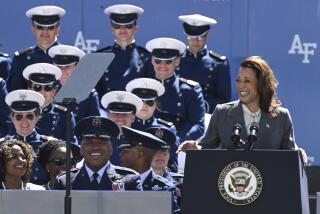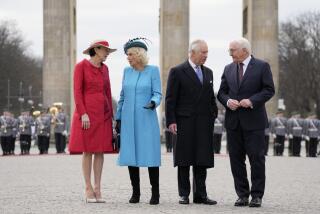Trade Talks Goal of U.S. at Summit : Reagan Sees Issue as More Important Than Dollar’s Role
- Share via
WASHINGTON — President Reagan, the uproar over his plan to visit the German military cemetery at Bitburg overshadowing the rest of his itinerary, leaves Tuesday for the annual economic summit meeting in Bonn, where he will risk controversy of a different sort by pressing for a new round of multilateral trade negotiations.
Although most U.S. allies regard the overvalued dollar as a more pressing problem than trade barriers, the Administration has made it clear that Reagan views trade talks as essential to prevent current frictions from breaking out into a full-scale trade war.
Three-Day Meeting
The annual three-day summit, which begins Thursday, will bring together Reagan and the leaders of six other industrial democracies: Canada, Britain, France, Italy, West Germany and Japan. The summit is part of Reagan’s 11-day European trip, which will also include visits to Spain, Portugal and France.
Despite Reagan’s determination to press for international trade talks, many political leaders on both sides of the Atlantic want the issue of the dollar to come first on the summit’s agenda. The Reagan Administration, though, fears that would lead to a collision over the massive U.S. budget deficits, which the Europeans hold ultimately responsible for the strong dollar.
In the United States, Senate Democrats and even Republican Sen. John C. Danforth of Missouri, chairman of the Senate Finance subcommittee on trade, have insisted that Reagan make the dollar a major topic on the summit agenda. The dollar, they argue, underlies last year’s record $123.3-billion trade deficit because it makes foreign goods cheap in the United States and U.S. products expensive overseas.
Grave Consequences
From the European standpoint, the highly valued dollar has grave consequences, raising the cost in Europe of dollar-priced imports such as oil. The Europeans regard the strong dollar as one consequence of high U.S. interest rates, which draw investment capital out of their countries and into the United States.
The European solution is to attack the high U.S. deficits, which are believed to prop up interest rates in this country. At the economic summit, France and West Germany are expected to press for talks on seeking greater stability in the international monetary system.
However, the Reagan Administration, arguing that the value of the dollar reflects not high U.S. interest rates but the relative strength of the U.S. economy, has opposed making currency alignment a major topic of discussion. It points out that the U.S. trade deficit has helped revive European economies by providing a market for European goods.
In the interest of promoting international trade talks, Reagan is even prepared to soft-pedal U.S. objections to the trade policies of Japan, which accounted for nearly a third of last year’s U.S. trade deficit. Reagan, who will meet with Japanese Prime Minister Yasuhiro Nakasone, does not want to lose Japan’s support for a series of trade talks designed to lower Japanese import barriers.
The United States is particularly eager to use trade negotiations to increase its exports of services, such as banking and insurance, for which only limited international free-trade guidelines now apply.
With trade only one of several nettlesome issues to be debated at the summit, Administration officials said that they hope the discussions are not overshadowed by the continuing controversy over Reagan’s plan to visit the Bitburg cemetery. The cemetery contains about 3,000 graves of dead from World Wars I and II, including 49 members of the Waffen SS, the combat branch of Adolf Hitler’s infamous security force. A different branch of the SS ran the death camps in which millions of Jews and others died.
Among other things, Reagan will discuss at the summit his hopes for an early meeting with Soviet leader Mikhail S. Gorbachev and will talk with European leaders about their countries’ possible participation in his Strategic Defense Initiative--the so-called “Star Wars” research program aimed at developing space-based defenses against nuclear missiles.
‘People Are Losing Sight’
Other major subjects expected to be discussed include arms control negotiations, East-West relations, U.S. policy in Central America, food aid for Africa and developments in international terrorism.
Reagan is scheduled to visit the Bergen-Belsen concentration camp and the Bitburg cemetery next Sunday after the conclusion of the summit. He then is to fly to Madrid for sessions with Spanish government and business leaders before going to Strasbourg, France, on May 8 for a major address to the European Parliament. He will then go to Lisbon, where he will address the Portuguese National Assembly on May 9 before returning to Washington the next day.
The President has pressed ahead with his plan to visit Bitburg despite a storm of protest from Jewish groups, veterans’ organizations and a majority of members of both the House and the Senate.
Administration officials have explained that Reagan accepted West German Chancellor Helmut Kohl’s invitation to participate in a visit to the ceremony as a reconciliation gesture before he knew that SS troopers were buried in Bitburg. The President now feels committed to go through with the visit, the officials said.
“The tragedy of the whole thing,” Republican Party Chairman Frank J. Fahrenkopf Jr. observed, “is people are losing sight of why he’s going to Europe. And here’s a man who throughout his entire public and private life has been a tremendous supporter of Israel and the armed services and an opponent of the Nazis and everything they stood for.”
Other Reagan advisers expressed concern that the Bitburg visit--combined with a faltering economy and setbacks in Congress on the budget and aid to the Nicaragua rebels--has distracted the President and tarnished his image just as he is preparing to leave for Europe.
One of his closest political advisers, who asked that he not be identified, said, “There is no question but that the President has been on the defensive longer and has been hurt more during the past three months than during any three-month period in his first term.”
This adviser says that, of all Reagan’s problems, Bitburg is the most serious and is likely to have the most lasting impact “because it goes to the heart and soul of the Jewish community.”
“The issue has really stabilized now,” he said, “and it’s too late for the President to cut the visit. It would only set off another firestorm of discussion.”
Other Reagan advisers say that they are counting on Reagan to deliver a speech in Germany that will put his Bitburg visit in the context of both his revulsion over the horrors of the Nazi regime and the reconciliation that has occurred between the United States and West Germany since World War II.
“He will have to make people understand he knows World War II was not just another war,” one aide said.
The White House considers that speech so crucial that it sent a distress call several days ago to Kenneth L. Khachigian of San Clemente, Reagan’s former chief speech writer, to help prepare it. Khachigian, an attorney and political consultant who also wrote speeches for Presidents Richard M. Nixon and Gerald R. Ford and served as a campaign aide to Gov. George Deukmejian, began working on the speech Friday.
The call to Khachigian came from Michael K. Deaver, the deputy White House chief of staff, who did the advance work on Reagan’s European trip.
More to Read
Get the L.A. Times Politics newsletter
Deeply reported insights into legislation, politics and policy from Sacramento, Washington and beyond. In your inbox twice per week.
You may occasionally receive promotional content from the Los Angeles Times.










